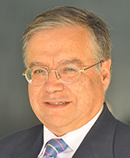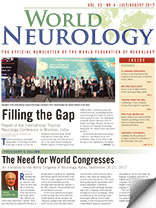
Prof. Renato J. Verdugo, MD, Chile
The Chilean Society of Neurology and the Panamerican Federation of Neurological Societies have honored me with a candidacy for the position of first vice president of the World Federation of Neurology (WFN). Although Latin Americans have actively participated in the WFN since its foundation, we have never had the opportunity to serve in a senior position within the federation.
During the last presidencies of the WFN, there has been a successful effort to expand WFN activities in regions such as Africa, Central Asia, parts of Eastern Europe, and Southeast Asia. As part of this initiative, the Panamerican Federation of Neurological Societies was finally launched, after years of hard work. I had the opportunity to participate in the creation of this federation, acting as its first vice president during the entire process of formation and registration. In this context of global expansion of the WFN, it would be important to ensure fair representation of the different active regions in its directive by incorporating a representative from Latin America.
For more than 10 years, I have been involved in the activities of the WFN, initially organizing the Panamerican Congresses of Neurology, then as a representative of Chile, and finally as president of the World Congress of Neurology in Santiago in 2015 and the launch of the Panamerican Federation of Neurological Societies, in 2016 and 2017. In these activities, I have always worked on a team with different members of the WFN, whose invaluable advice and support have always been fundamental for the success of these enterprises. The position of vice president is a key part of this teamwork, as he or she needs to interact with the president and different members of the board, as well as the representatives of different regions and countries. He or she also must act as supervisor and collaborator of the organization of the World Congress of Neurology every other year, among other concrete tasks.
After almost four years in a fellowship on peripheral nerve disorders in the United States, and later visiting different academic centers in Latin America, I have had the opportunity to know the reality of neurology in developed and developing countries; this is essential to serve in a global federation that must be effective in supporting the development of neurology throughout the whole world. As a member of the editorial board of the Neuromuscular Cochrane review group and member at large of the International Federation of Clinical Neurophysiology, I have had the opportunity to work with professionals coming from different latitudes and backgrounds, establishing permanent and fruitful links among them.
The integration of neurologists from all over the world requires a strengthening of the digital media made available by the WFN, making wise use of the multiple opportunities provided by the internet and social networks. To increase the attractiveness of the WFN to young neurologists, it is important to develop channels of timely information through our website and the creation of Twitter and Facebook accounts, as well as a YouTube channel. These are sources of information widely used by younger generations; our federation could take advantage of them to reach a wider audience. Furthermore, it is necessary to create a special group for horizon scanning on this topic, to keep the WFN always updated on the use of new and always growing technologies. Social networks are also a valuable tool to reach patients and the general public that may benefit from proper information and orientation in neurology and related disciplines.
Ethical issues are of growing concern in the medical sciences in general, and in neurology in particular. The WFN must be a reference on this subject, taking advantage of the numerous experts who come together in its different activities and may produce orientations and consensus in this field.
It is also important to continue to strengthen the interaction of the WFN with other scientific and medical societies in related fields, such as the continued collaboration with the WHO, which would allow us to channel our expertise and experience in the different topics that are important for the worldwide development of neurology.
The WFN is our shared home, and it needs the continuous work of neurologists from the entire world. If I am elected as vice president, I will be a faithful servant to this goal. If not, I will continue collaborating with the elected directive as I have done for the last 10 years. •
